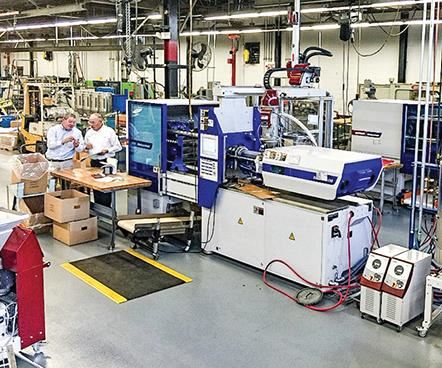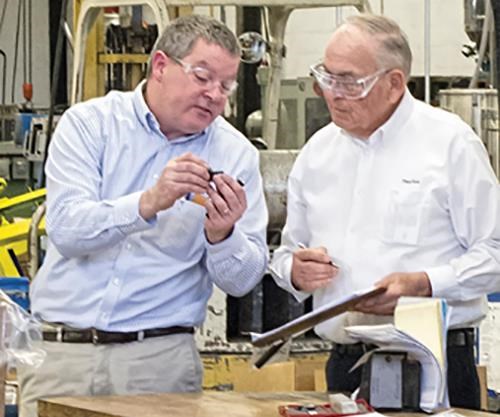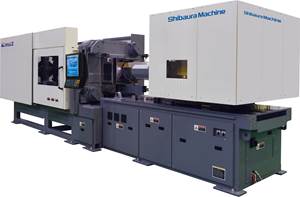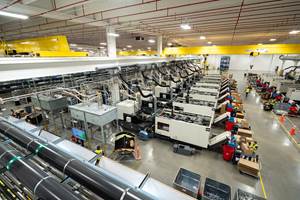High-Tech Molder Modernizes Its Fleet
EPC replaces older presses with its first all-electrics, in integrated cells from a single source.
When Matt McKenney came on board as general manager of Ensinger Precision Components (EPC) three years ago, a top priority was modernizing the plant’s fleet of injection machines. The 32-year injection molding veteran saw no alternative for a precision molder specializing in aerospace, defense, and medical applications using high-performance resins like PEEK, Ultem PEI, PPS, Torlon PAI, and Aurum TP polyimides, often with glass or carbon fibers. He says, “It’s important for us to modernize our equipment, not only for better performance, but to show customers we’re investing in our business.”
The latest phase in this program at EPC was the recent installation of three new molding cells based on EcoPower presses of 55, 110, and 180 metric tons from Wittmann Battenfeld, Inc., Torrington, Conn. They replaced three older machines, keeping the plant’s total at 20. The new additions dropped the average age of EPC’s machines (40 to 500 tons) from 18 years to 14, and McKenney’s goal is to bring that down to 10 years.
EPC in Putnam, Conn., is part of the $450-million Ensinger Group, based in Germany. EPC is one of five businesses of Ensinger North America. EPC is the descendant of a U.S. business that goes back 81 years and was one of the first companies to mold nylon in the 1940s, and also acted as the sole distributor of Battenfeld plunger machines in the 1950s. It was called Putnam Precision Molding when Ensinger acquired it in 1996.
The Putnam plant today occupies 66,000 ft2 and employs 66 people. Injection molding is 80% of its business, the rest being spin casting of PEEK tubes and plastic part machining. Besides custom parts production, 20% of its molding business is stock shapes.
“Buying these three new machines was a six-month project,” says McKenney. “We got the whole team involved. We examined eight machine suppliers and ultimately made a conscious decision to partner with Wittmann. It was a unanimous choice.”
One deciding factor was a single source for the presses and auxiliaries—including six temperature-control units, three dryers, six integral loaders, three granulators, and three servo robots. Notes McKenney, “What swayed the team most of all, beyond the quality of the product, was the ability to have all the equipment related to an injection molding cell manufactured by one company. This makes the line of communication very clear.”
Another key consideration, according to McKenney, was Wittmann’s “commitment to this region.” Located only 70 miles from EPC, “They have much bigger training facilities and staff than other vendors in the region.” The new work cells were fully assembled by Wittmann in Torrington and ran trials with EPC’s molds before being shipped to Putnam.
A third consideration was the user-friendliness of Wittmann Battenfeld’s controls. “Our people find them more intuitive than other brands,” McKenney says.
As for performance, McKenney reports that “a customer saw a test run from the new Battenfeld 110 and said he had never seen such repeatability over 50 parts. It was a PEEK part with dimensional tolerances of +0.5/-1 mil.” EPC is planning another purchase this year of a Wittmann Battenfeld vertical press for molding thick stock shapes. “They require very consistent packing with a weight variation less than 0.3% on parts up to 10 oz.”
The new presses are EPC’s first all-electric models. “We won’t buy any more conventional hydraulic presses,” says McKenney. “Power is very expensive here.”
Related Content
Scaling New Heights With Vertical Integration
Eden Manufacturing was founded on a vision of vertical integration, adding advanced injection molding capabilities to a base of precision moldmaking and more recently bringing Swiss-type machining capabilities in-house.
Read MoreLS Mtron’s Outsized NPE2024 Presence Jump-Starts Ambitious North American Market Goals
The Korean maker of injection molding machines featured eight machines in its nearly 14,000-square-foot booth with additional presses at Yushin and Incoe’s booths, as it targets 20% market share.
Read MoreCompletely Connected Molding
NPE2024: Medical, inmold labeling, core-back molding and Industry 4.0 technologies on display at Shibaura’s booth.
Read MoreIPEX Opens Injection Molding Facility in North Carolina
The pipe and fittings manufacturer’s new 200,000-square-foot facility represents a $200 million investment and will create 150 jobs.
Read MoreRead Next
For PLASTICS' CEO Seaholm, NPE to Shine Light on Sustainability Successes
With advocacy, communication and sustainability as three main pillars, Seaholm leads a trade association to NPE that ‘is more active today than we have ever been.’
Read MoreBeyond Prototypes: 8 Ways the Plastics Industry Is Using 3D Printing
Plastics processors are finding applications for 3D printing around the plant and across the supply chain. Here are 8 examples to look for at NPE2024.
Read MoreMaking the Circular Economy a Reality
Driven by brand owner demands and new worldwide legislation, the entire supply chain is working toward the shift to circularity, with some evidence the circular economy has already begun.
Read More

















